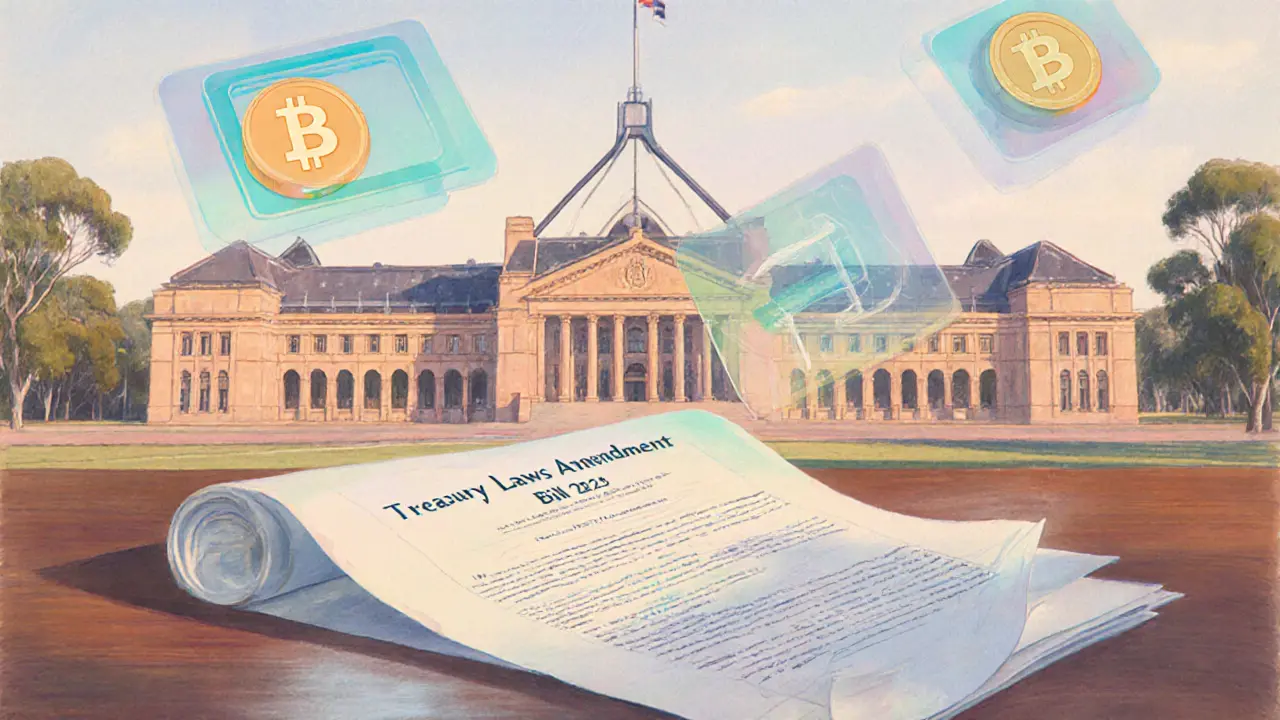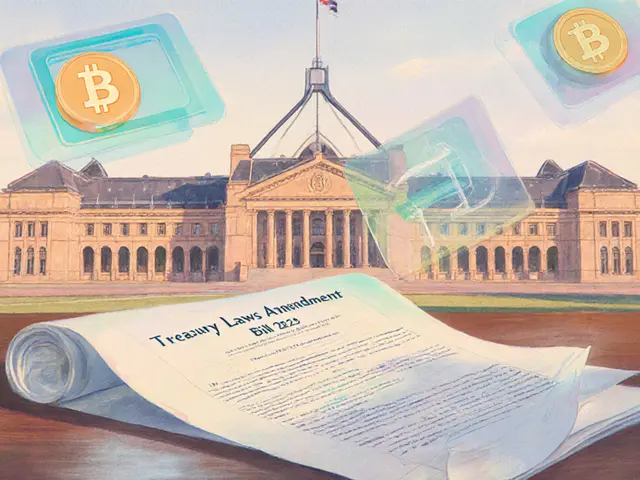Australia’s New Crypto Consumer Protection Rules Explained

Crypto Platform Checker
Check Your Crypto Platform
Enter your platform's details below to see if it meets Australian consumer protection requirements.
Compliance Result
Platform Classification Guide
Under the new Australian rules, platforms are classified based on:
- Licensed Platform - Must have an AFSL, unlimited transaction limits, and full compliance
- Low-Risk Exempt - Meets specific thresholds and only registers with AUSTRAC
Use the checker above to determine your platform's classification.
Australia is about to reshape how everyday people trade and hold crypto. The government’s Treasury Laws Amendment Bill 2025: Digital Asset, and Tokenised Custody, Platforms a draft law that will bring crypto exchanges and custodians under the same rules as traditional financial services is now in public consultation, and it promises stronger crypto consumer protection Australia without choking innovation.
Why a new framework was needed
The 2022 collapse of FTX the US‑based crypto exchange that went bust, exposing massive gaps in investor safeguards sent shockwaves through the Australian market. Regulators realized that existing rules - a patchwork of anti‑money‑laundering (AML) requirements from AUSTRAC Australia’s financial intelligence agency that oversees AML/CTF compliance and selective product‑level oversight from ASIC the Australian Securities and Investments Commission, which enforces consumer‑protection and financial‑product laws - left many crypto platforms in a regulatory grey zone.
Consumers faced two main problems: unclear recourse if a platform failed, and the risk of misleading marketing that fell outside traditional financial‑product definitions. The new bill attempts to fix both by anchoring crypto platforms within the Corporations Act 2001.
Key provisions of the Treasury Laws Amendment Bill 2025
The draft creates two fresh product categories under the Corporations Act:
- Digital Asset Platforms (DAP) services that enable buying, selling or trading of digital assets like Bitcoin, NFTs and stablecoins
- Tokenised Custody Platforms (TCP) providers that hold digital tokens on behalf of clients, similar to traditional custodians for securities
Both categories are collectively referred to as “crypto platforms.” Every crypto platform must now secure an Australian Financial Services Licence (AFSL) a licence that obliges firms to meet conduct, disclosure and competence standards set out for financial service providers. The AFSL brings a host of obligations:
- Clear, non‑misleading product disclosures.
- Competence and training requirements for senior managers.
- Conflict‑of‑interest policies and robust risk‑management frameworks.
- External dispute‑resolution (EDR) processes and compensation schemes for harmed consumers.
Breaches can trigger penalties of $16.5million or more, signalling that regulators intend to treat crypto platforms with the same seriousness as banks and brokers.
Who is exempt and why exemptions matter
Not every crypto service will need a full AFSL. The bill carves out a “low‑risk” exemption for platforms that:
- Process less than $5,000 per customer.
- Conduct under $10million in total annual transaction volume.
Exempt platforms still must register with AUSTRAC for AML/CTF purposes, but they avoid the heavier licensing costs. For consumers, this creates a clear line: if a platform can’t meet the exemption thresholds, it must be fully licensed, offering stronger guarantees of conduct and compensation.

Existing safeguards that remain in place
Even after the new regime lands, two pillars of Australian consumer protection will continue to apply:
- Australian Consumer Law (ACL) the nation’s broad consumer‑protection framework that bans misleading or deceptive conduct across all goods and services.
- ASIC’s ongoing surveillance of crypto‑asset offerings that qualify as financial products, which already require holders of an AFS licence.
Marketing pitches for crypto‑related services must now survive scrutiny under both the ACL and, where applicable, the financial‑product rules. This dual‑layer approach reduces the chance of “pump‑and‑dump” schemes slipping through the cracks.
What the changes mean for everyday crypto users
From a consumer’s perspective, the reforms translate into three practical benefits:
- Transparency: Licensed platforms must publish a Financial Services Guide (FSG) that explains fees, risks and dispute‑resolution options in plain language.
- Recourse: If a licensed platform collapses or misbehaves, consumers can lodge complaints with ASIC’s EDR scheme, which can award compensation up to the amount lost.
- Confidence: Knowing a platform has cleared the AFSL hurdle reassures users that the business meets national standards for competence and financial stability.
Conversely, users should stay wary of unlicensed or “low‑risk” platforms that do not offer the same level of protection. Checking a platform’s licence status is as simple as searching the ASIC register or the AUSTRAC registry.
Industry reaction and the road ahead
Local exchanges such as Independent Reserve an Australian crypto exchange that has operated since 2013 and BTC Markets another long‑standing Australian crypto exchange have publicly welcomed the draft, noting that licensing costs are a worthwhile trade‑off for market legitimacy.
Daniel Mulino Assistant Treasurer of Australia, who leads the Treasury’s digital‑asset agenda described the bill as a move to “legitimize good actors and shut out bad.” However, CEOs like Kate Cooper CEO of OKX Australia, who highlighted the importance of level playing fields for licensed operators stress that enforcement will be the real test.
The consultation period runs until 24October2025. After that, the Treasury expects to finalize the amendments and give the Australian Securities and Investments Commission a clear mandate to enforce them. Expect a rollout phase in early 2026, with a phased approach for platforms to upgrade their compliance systems.

Quick checklist for consumers
- Verify the platform holds an AFSL - check ASIC’s public licence register.
- Read the platform’s Financial Services Guide for fee and risk disclosures.
- Confirm the platform is registered with AUSTRAC for AML/CTF compliance.
- Prefer platforms that offer an external dispute‑resolution scheme.
- Be cautious of services advertising “no licence required” if they exceed the low‑risk thresholds.
Comparison of Licensed vs. Low‑Risk Exempt Platforms
| Aspect | Licensed Platform (DAP/TCP) | Low‑Risk Exempt Platform |
|---|---|---|
| Regulatory body | ASIC (AFSL) + AUSTRAC | AUSTRAC only |
| Transaction limit per customer | Unlimited | ≤$5,000 |
| Annual transaction volume | No cap | ≤$10million |
| Disclosure requirements | Financial Services Guide, ongoing compliance reporting | Basic AML/CTF reporting |
| Consumer compensation | EDR‑mediated compensation up to loss amount | Limited - depends on contract terms |
| Penalties for breach | Up to $16.5million or higher | Standard AML/CTF fines |
Next steps for the sector
Businesses should start preparing now. Key actions include:
- Conduct a self‑assessment against AFSL criteria - governance, risk, training and disclosure.
- Upgrade KYC/AML systems to meet AUSTRAC’s transaction‑monitoring standards.
- Draft a clear Financial Services Guide that complies with ASIC’s template.
- Engage legal counsel early - law firms such as Thomson Geer have published guidance on the bill.
- Monitor the Treasury’s consultation responses; those can shape final thresholds.
Consumers, meanwhile, can take comfort that the Australian market is moving toward a more secure environment. By checking licences and staying informed about the upcoming changes, they’ll be better positioned to avoid scams and enjoy the benefits of a regulated digital‑asset ecosystem.
Frequently Asked Questions
Do I need to register with AUSTRAC if I only hold crypto in a private wallet?
No. AUSTRAC registration applies to businesses that provide exchange, custodial or brokerage services. Individual holders of private wallets are not required to register, although they must still comply with general tax obligations.
Can a platform be both a DAP and a TCP?
Yes. Many exchanges also offer custodial wallets, so they fall under both categories and must meet the combined licensing requirements of the AFSL.
What happens if a licensed crypto platform collapses?
Consumers can lodge a complaint with ASIC’s external dispute‑resolution scheme. If the platform held client assets in trust, compensation may be paid from the platform’s insurance or segregation funds, subject to the terms of the licence.
Are NFTs covered by the new consumer‑protection rules?
Collectible NFTs are included under the DAP definition, so platforms that trade them must be licensed. However, NFTs used solely in gaming ecosystems are exempt from the licensing requirement, though they still must avoid deceptive marketing.
How can I verify if a platform holds an AFSL?
Visit the ASIC register of licensed entities and search by the company name or ABN. The entry will list the licence number, status and any conditions attached.







This is actually a big deal. Finally, someone’s treating crypto like real finance.
It is imperative to underscore that the legislative framework under consideration constitutes a paradigmatic shift in the regulatory architecture governing digital asset intermediaries within the Australian jurisdiction. The integration of crypto platforms into the Corporations Act 2001 signifies a formal recognition of their systemic importance and attendant fiduciary responsibilities.
Yessss! 🙌 Australia’s finally catching up and doing it right! No more shady exchanges pretending they’re ‘just tech’. I’ve seen friends lose everything because no one was watching. Now if only the US would take notes 😅
So now we gotta pay for licenses just to buy Bitcoin? Cool. Can’t wait for the $200/month fee to ‘verify’ my wallet. This is just regulation theater.
Great move! But wait-did they forget to mention the AML kyc upgrades? Most small platforms cant afford the tech to track every tiny transaciton. Also, what about peer to peer trades? This feels like it’ll push users to unregulated stuff. Just sayin’ 😅
People need to understand this isn’t about stopping crypto-it’s about making sure you’re not getting scammed by some guy in a basement with a fake website. If you’re using a platform that doesn’t show its AFSL, you’re playing Russian roulette with your money. Check the ASIC register. It takes 30 seconds.
Why is Australia telling the world how to run finance? We don’t need some island nation dictating crypto rules. Let the market decide. This is socialist overreach disguised as consumer protection.
It’s interesting how we treat money differently based on its form. A stock is sacred, a crypto is chaos-until it’s not. Maybe the real win here is that we’re finally treating digital assets with the same seriousness as anything else that holds value. No more ‘trust me bro’ economics.
Wow! 🇦🇺✨ Australia leading the way! 🌍 This is what responsible innovation looks like-balancing freedom with safety. Kudos to the Treasury team! 🙏🇮🇳 And yes, NFTs are included? Perfect! Now my digital art collection gets real protection too! 🎨💎
So now my crypto app has to give me a 50-page ‘Financial Services Guide’ just to buy Dogecoin? 😂 I’ll just use the one that says ‘no license needed’ and pray. Thanks, regulators.
This is huge for Africa too. So many young people here are using crypto because banks won’t serve them. But if these platforms aren’t legit, they’ll get wiped out. Australia’s model could be a blueprint-clear rules, no loopholes. Let’s hope other countries follow.
Wait, so if I trade under $5k I’m exempt? But what if I do 1000 tiny trades? Does that count as ‘under $5k per customer’? The wording here is kinda fuzzy. Hope ASIC clarifies this soon.
While the intention behind this legislation is commendable, one must consider the potential for regulatory capture. The cost of compliance may disproportionately favor established players, effectively creating barriers to entry for smaller innovators. A nuanced approach to tiered regulation may better serve both consumers and market diversity.
More red tape. More fees. More excuses for the government to control what we do with our money. Just let people choose. If you get scammed, you’re dumb. Not the government’s job to babysit.